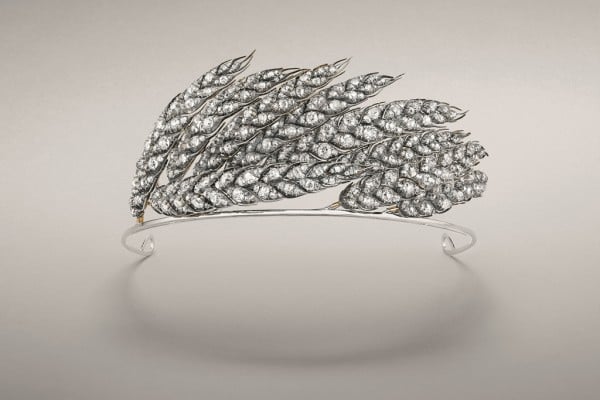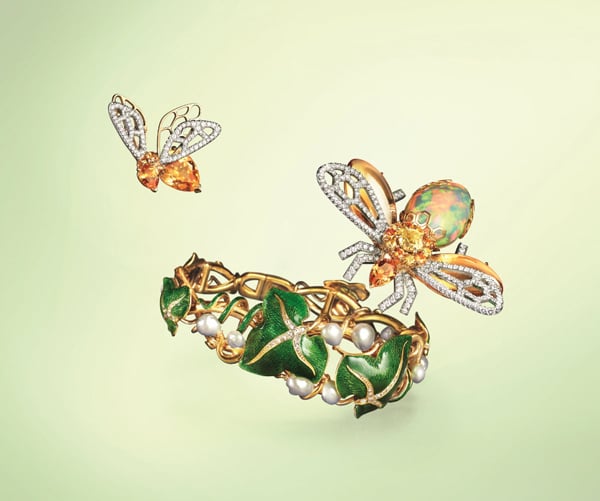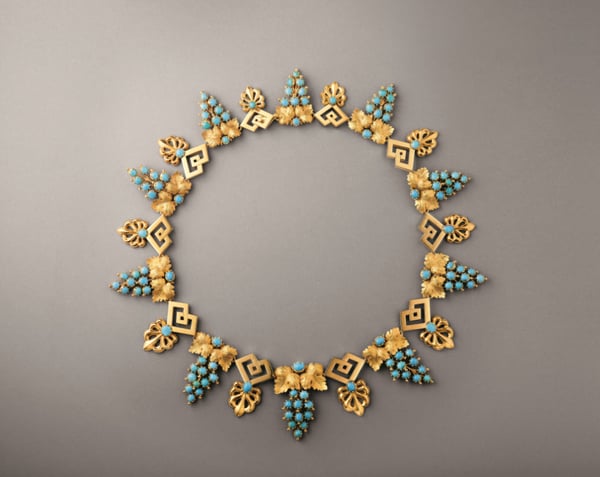Art & Exhibitions
Haute Jeweler Chaumet Spotlights its Lavish Heritage with Paris Exhibition
Chaumet had an avant-garde predilection for customization.

Photo: courtesy Chaumet.
Chaumet had an avant-garde predilection for customization.

Emily Nathan

It takes courage to enter a haute jewelry house: Armored doors, armed security guards, and salespeople in fine suits do not generally inspire confidence in the casual window shopper. But earlier this month, Paris-based jeweler Maison Chaumet made a bid to change that, transforming the boutique next to its flagship store on the diamond-dizzy Place Vendôme into the Musée Ephémère, an exhibition space that is accessible to—and welcoming of—the public.
Founded in 1780 by jewelry designer Marie-Étienne Nitot, Chaumet has a history of royal and aristocratic collaborations, originally working for Queen Marie-Antoinette and later as the official jeweller to Emperor Napoleon the First. (It later attracted art-world stars like Picasso, who chose Chaumet for wife Olga Khokhlova.) That rich patronage is visited by the museum’s first show, “Promenade Bucolic,” which presents 17 diadems, watches, bracelets, necklaces, and rings produced over the past two centuries, as well as never-before-seen drawings, maquettes, and photographs drawn from Chaumet’s expansive holdings—one of the world’s largest jewelry archives.
On view through January 30, 2016, the presentation explores the theme of “naturalism” that has occupied Chaumet designers from the start—but don’t expect conventional treatment of such a conventional subject. Instead of perfect bouquets of roses and violets, Chaumet’s jewels depict the natural world in movement, as a wild and living thing: wreaths of laurel are wind-tousled, wheat stalks house grasshoppers, and bees are caught in flagrante delicto.

Photo: courtesy Chaumet
But first things first. A small room at the back has been transformed into a “cabinet of curiosities” that takes us through the design process from start to finish. One wall is hung with artist sketches done at the behest of Chaumet clients and then presented to them for final selection. (Check marks and notations in pencil add a charming human element to the display.) A wall-text explains that the House always worked with renowned artists from around the globe, including winners of the Grand Prix de Rome during the Belle Époque—and indeed, the drawings are as meticulously rendered as nature studies. In a neighboring vitrine, iron and wax maquettes demonstrate the next step in any commission, and finally we see the resulting treasures, displayed on delicate beds of colored silk.
Throughout the presentation, Chaumet’s emphasis on craftsmanship is matched by its playfulness. In a brooch from 1840, three diamond flowers actually hang from a jeweled stamen—they were designed to gently swing as the wearer walked. And a green bracelet, gifted by magistrate Nicolas Persil to his wife Agathe in 1847, plays on the symbolic power of ivy to communicate its double-message: “Je m’attache ou je meurs,” (I cling or I die). Of course, the House also capitalized on the marketing opportunity at hand, producing a collection of 13 “bee-themed” jewels in a range of honey hues specifically for the show, as well as two limited-edition pieces sold exclusively on site.

Photo: courtesy Chaumet
The most surprising discovery in this “promenade bucolique,” however, is Chaumet’s avant-garde predilection for customization, best embodied in a tiara commissioned by Empress Marie-Louise, Napoleon’s second wife, around 1811. Known to appreciate natural motifs, she asked Nitot to create 150 stalks of jeweled wheat for her to wear; the crown he produced is entirely adjustable, studded with diamond shoots that can be removed or repositioned in any number of ways, worn loose in the hair or even as a brooch.
Ultimately, creating haute jewelry that allows for and adapts to the shifting moods of your clientele might be just as modern a move as allowing laymen with no intention of buying into your boutique—and as this show makes clear, that’s just the Chaumet way.
Related stories:
Find Out How Jewelry Inspired by the Stars Becomes Art
Elizabeth Taylor Trust Sues Christie’s Over $8 Million Botched Jewel Sale
Delightful Met Show Explores the Meaning of Rings and Enduring Appeal of Jewels